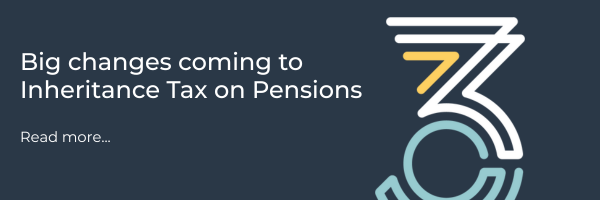How things work right now:
If you have a defined contribution pension (a pot of money you build up for retirement) it’s currently not counted as part of your estate when you die. This means it isn’t subjected to inheritance tax (IHT).
What is changing in 2027?
Starting 6th April 2027, the government plans to include defined contribution pensions in your estate for inheritance tax purposes. This means your loved ones could face tax charges of 40% on any unused pension money you leave behind.
Will this affect you?
Everyone in the UK has a £325,000 inheritance tax-free allowance (called the nil rate band). If your total estate, including your home, savings, and pension, goes over this amount, inheritance tax may be due.
So, if your pension pushes your estate above the threshold, your family might have to pay tax when you or your spouse dies.
What if you’re married or in a civil partnership?
If you’re married or in a civil partnership, anything you leave to your spouse is tax-free. Plus, any unused portion of your £325,000 allowance can be passed on to your partner. This means up to £650,000 could be passed on tax-free when the surviving partner dies.
There’s also something called the Residence Nil Rate Band, providing an extra £175,000 per person if you leave your home (or its value) to children or grandchildren. However, this is capped at the value of the property, so if your home is worth less than £175,000, you can only claim up to that amount.
Potentially, a couple could jointly pass on up to £1 million tax-free, combining the nil rate band and RNRB.
Unfortunately, unmarried couples don’t get these benefits. If you’re living together, but not married or in a civil partnership, only the individual £325,000 allowance applies.
How can you reduce the impact of IHT?
If your estate might go over the threshold, here are a few things to consider:
Gift money while you’re alive: You could help children or grandchildren by giving them money now, whether as a lump sum or by contributing to their pensions or ISAs. However, certain gifts made in the 7 years before death can also form part of the estate’s value when you die and may be subjected to IHT. Additionally, IHT may still apply to some gifts after your death, depending on when and how they were given.
If you’re considering gifting from your pension, only 25% tax-free cash (TFC) can be withdrawn without any income tax. Any additional withdrawals will be taxed at your marginal income tax rate, which needs to be weighed against potential IHT savings.
Therefore, it’s best to consult a qualified financial adviser to ensure your gifting strategy is tax-efficient and aligns with current regulations.
Plan carefully: Careful planning can also help ensure your loved ones aren’t left in a difficult financial situation due to unexpected tax bills. It’s a good idea to speak to a qualified financial adviser to make sure your plans are tax-efficient and secure.
This article is intended as a brief guide to the subject matter and in no way constitutes advice or recommendation. The article is based on our understanding of current and proposed legislation which could be subject to change at any time. Specific financial and legal advice should always be sought before taking any action.
If you would like more information, please get in touch with us.


